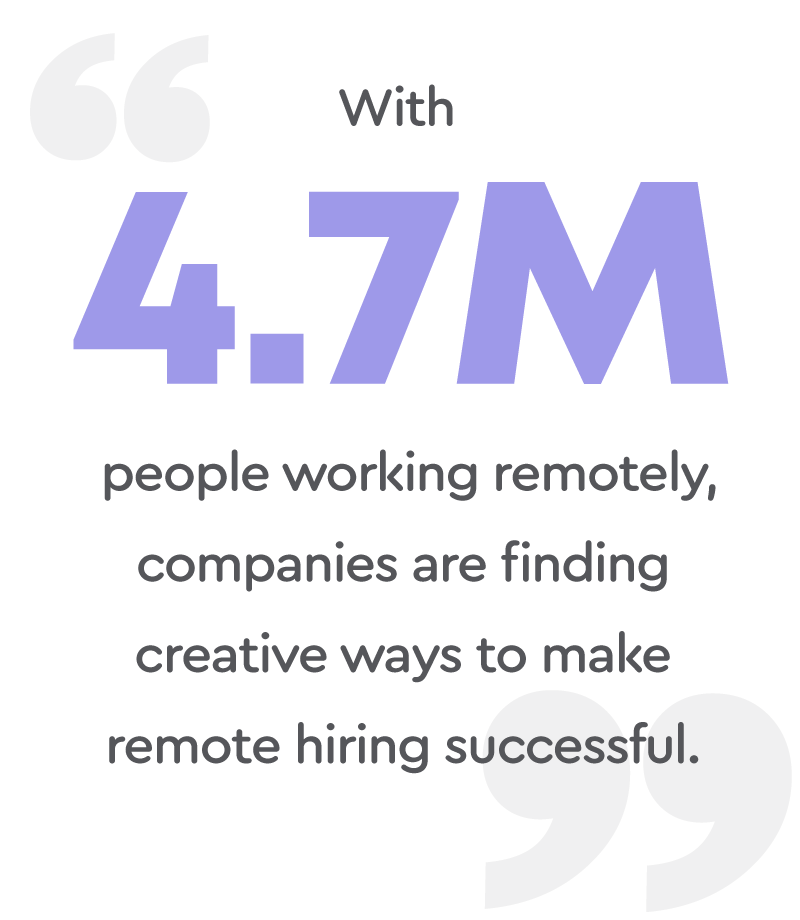How to Recruit, Hire & Retain Effectively in a Remote World – Fireside Chat Recap

“Leveraging the technology that we have today is going to drive more objectivity in the process, create a better experience for everyone involved, and certainly drive more efficiency,” noted Ron Wilson, CEO of interviewstream when he met with Kyle Leigh, VP of Strategy at Bayard and Larry Jacobson, Global Head of Talent Acquisition at SimpliSafe, to discuss how they are handling remote recruitment, hiring, and retention today.
The group touched on four key points — here’s a short recap with sound bites from their full discussion.
1. How do you plan to hire thousands of people that you’ve never met?
The important component here is that this goes both ways – how do you hire a candidate you have never met, but also how do you attract a candidate without them ever physically seeing your space or meeting the team? Many companies have made the switch to video interviewing, using several different platforms, however it seems their processes have not vastly changed. The key changes to hiring & recruiting that they have made are mostly tied to updating interview questions to focus on:
- Self-discipline and focus
- Work space and technology
- Lifestyle flexibility needs
This, combined with a large focus on sharing company culture and core values, are key to making the right hires in this mostly remote world.
2. What processes & tools have you found to be most effective?
With 4.7 million people working remotely, companies are finding creative ways to make remote hiring successful. These innovative remote hiring processes have fallen into two buckets for these businesses – video interviewing and virtual job fairs. The panel discussed each option a bit in detail:
- Video Interviewing: Many companies have adjusted to remote interviewing quickly and have continued to iterate as our remote status has continued. There are a multitude of services available that are great for live interaction, but they are not intentionally built for interviewing. You want to have an all-in-one platform to create a more seamless experience for candidates, hiring teams, and recruiters, as well as to implement a more objective process.
- Virtual Hiring Events: Employers that hire in high volume find hiring events to be a really successful tool, yet event costs are high. Virtual hiring events are just as effective at a fraction of the cost. Employers and job seekers are finding that they save both time and money; geographical limitations are eliminated; and the hiring process is accelerated.
3. How has remote work impacted your ability to retain and attract talent?
Turn-over rates have remained consistently low in 2020. With the switch to work-from-home, employees have gained more freedom which for some companies, has actually increased retention.
That said, attracting new talent has been interesting. The common perception today is that it is currently easy to hire, however potential candidates these days often fear change and, right now, are just happy to have a stable job that they understand. Companies like those on this panel are seeing an increase in both rejected offers and counter offers being made and accepted from employers than in the past. People are hesitant to jump and make a change right now which can make hiring key talent even more difficult than in the prior job market.
4. What do you see remaining as a part of your recruiting strategy long-term?
Remote work, which allows employee flexibility and removes the perception that work needs to happen between 8:00am-5:00pm daily, is here to stay. And with that permanent change, the elimination of geographical limitations will remain. The consensus from this panel is that the shift to a national or global talent pool, which has allowed access to top candidates that would have been previously inaccessible, will continue to be a part of many companies’ longer term recruiting and hiring strategies.
While remote work continues to be the norm, we can expect to see video interviewing and fully remote hiring as a long term strategy as well. Video interviewing compresses the interview cycle and takes less administrative time. Not only is it necessary for success in today’s hiring environment, it has proven to be effective.
Although we here at interviewstream are certainly biased, we believe that with the use of our tools, the overall virtual hiring process is both a better and more efficient process for all. The shift to a remote world has most certainly presented its challenges, nonetheless, it has also opened the doors to many new opportunities. As companies continue to adapt to this environment, we anticipate seeing more creative solutions emerge, along with a lot more virtual meetings.
“Although we here at interviewstream are certainly biased, we believe that with the use of our tools, the overall virtual hiring process
is both a better and more efficient process for all.”
Ron Wilson, CEO at interviewstream
Thank you to Ron Wilson, Kyle Leigh, and Larry Jacobson for sharing your thoughts and experiences. To check out the full fireside chat, click here.
About The Author
Esteban Gomez is a marketing consultant with interviewstream. He loves learning and has a passion for traveling, having visited many countries including China, Colombia, Italy, and Peru.
